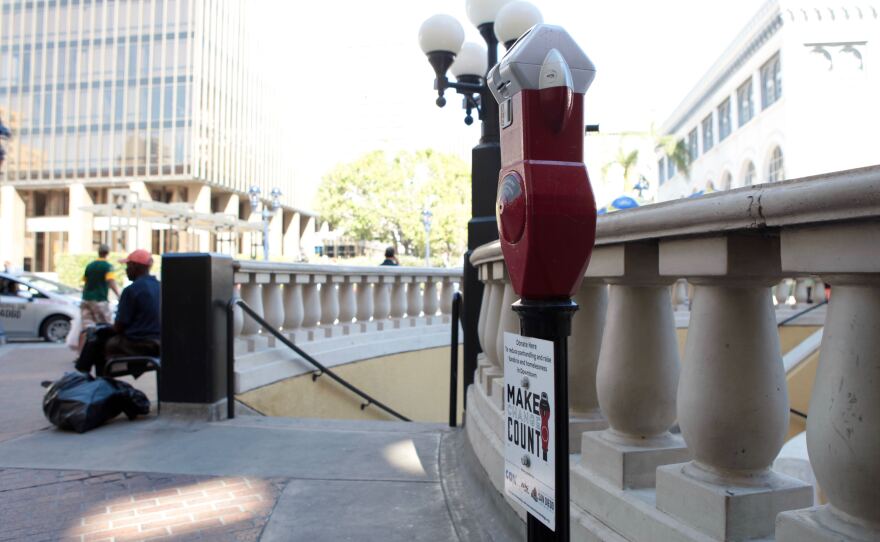The red meters scattered throughout downtown San Diego that collect donations for the homeless have raised nearly $10,000 since the first of nearly two dozen stations was installed four years ago.
While the total is far from enough money to help the city end its fight against homelessness, the nonprofit organization that operates the donation program says the meters are about more than generating money for homeless services.
“They were never meant to be a huge money-raiser,” said Kelly Knight, homeless outreach coordinator for the Downtown San Diego Partnership’s Clean & Safe program. “They were meant to be an awareness and an education tool.”
Next month marks four years since the Downtown San Diego Partnership installed the first donation meter. Since then, the nonprofit group has erected a total of 21 donation stations throughout downtown as part of its Make Change Count program.
The stations, which look like red parking meters and are located on private property, accept coin and credit card payments.

According to figures provided by the Downtown Partnership, meter donations have gradually increased each year. In fiscal 2012, the meters collected less than $1,000. In the last fiscal year, they generated more than $4,000.
Most of the money raised through the donation meters — roughly $6,500 — has gone toward a program called Work Your Way Home, which helps reunite homeless people with their family members. The rest of the money has been used to pay for credit card transaction fees associated with the donations and new donation meters.
Knight said the Work Your Way Home program helps identify family members who are able and willing to take in homeless relatives or loved ones struggling in San Diego. Once the connection is established, the program pays for their ticket home, she said.
“In exchange, we ask them to do a little work,” Knight said.
“That feature of the program is so important because it isn’t just moving folks out of the city and not caring about them,” said Dolores Diaz, executive director of the San Diego County Regional Task Force on the Homeless. “It is a compassionate way to reunify folks with some dignity.”
San Diego is one of several cities across the country that has installed donation meters for the homeless. Some programs have been more successful than others.
Supporters of the donation meters tout them as a way for people to contribute to organizations that know how to effectively care for the homeless. Critics argue that the meters are mainly used as a way to discourage panhandling and push the homeless out of downtown business districts.
“The whole idea is, don’t give money to poor people because if you do they’ll hang around,” said Paul Boden, executive director of the Western Regional Advocacy Project, a San Francisco-based organization that advocates for the homeless.
Boden said it’s upsetting that organizations in San Diego and other cities have spent so much time and resources installing donation meters. He said they haven’t generated much money and aren’t addressing the root causes of homelessness.
But Knight said the Downtown Partnership is encouraged by the success of its program. The nonprofit has plans to install 10 more meters downtown in the near future, she said.





